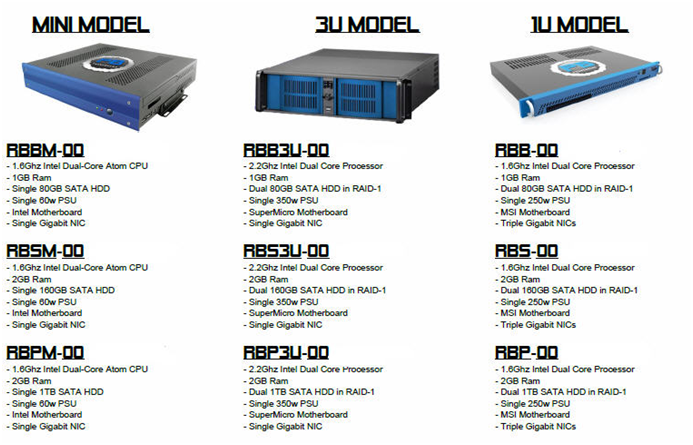Open Source PBX Comparisons
So if you have been following my previous posts on open source software and hardware requirements, you are well aware that you have many options to choose from when choosing to go with an open sourced based PBX for your solution. Since one of its core features is…well…unlimited possibilities, you have many areas to consider, most of which we have already covered in the software and hardware requirements posts. Heck we have even compared open-sourced solutions to commercial based VoIP solutions so you have a good understanding of the differences between the two.
The last area we need to cover is the available options you have when purchasing an open-sourced based IP PBX. This includes hardware options and add-ons as well as software options.
If you are one of those readers that were very intrigued about my post on necessary hardware requirements needed to operate a phone system, and wish to build your own server, then stop reading, and start building. If you were one of those people that understand which hardware requirements are needed for your solution but don’t wish to build your own, well then, this is your post.
Below, we will discuss a few options you have when purchasing a pre-installed fully tested open-sourced based IP PBX server.
PhoneBochs Open Source PBX Systems
 The first offering I want to focus on is a product called Phonebochs which is manufactured by a company called Rockbochs. Phoneboch’s server appliances come in three different form factors which I will discuss below.
The first offering I want to focus on is a product called Phonebochs which is manufactured by a company called Rockbochs. Phoneboch’s server appliances come in three different form factors which I will discuss below.
With any Phoneboch’s server option, you can specify which open-sourced based software you wish to have pre-installed and tested before it ships to you. This includes but is not limited to Trixbox CE, Elastix, FreePBX, PBXinaFlash, and command line Asterisk. With any Phoneboch’s solution, if telephony cards are needed, they will install Sangoma analog and digital PCI telephony cards with ECHO Cancellation. Phoneboch’s fully supports both the hardware and software platforms loaded onto the server appliances and also offers hourly paid support contracts.
Below is brief look at the available options you have with most Phoneboch’s appliances:
- Form Factors – Phoneboch’s appliances come in three form factor flavors. A Mini appliance denoted by its “RBBM” name, a 1U server noted by its “RBB” name, and a 3U server noted by its “RBB3U” name. Keep in mind when choosing which form factor server you wish to go with, your physical space requirements where you will be storing the server, and also your PCI card requirements. Both the 1U and Mini server can only handle up to 2 total PCI cards using Sangoma’s back-plane technology. If your server requires more than 2 PCI telephony cards, you will want to go with the 3U chassis.
- Model Versions – While Phoneboch’s come in three different form factors, there are also different models offered that still use the Mini, 1U, and 3U form factor but come pre-loaded with more RAM, faster processers, and bigger hard drives. Which each form factor, there are 3 different models; a Basic model noted by its “B” nomenclature, a Standard model noted by its “S” nomenclature, and a Premium model noted by its “P” nomenclature. So in a nutshell, the below Quick guide shows the differences in hardware between each model and form factor and notice that price does increase when you upgrade to standard and premium models.

- Additional Hardware Add-on’s – So if the above versions don’t completely meet your needs, Phonebochs also offers additional hardware components to add to your solution. Any hardware component that you add to your solution before you purchase it gets pre-installed by Rockboch’s before shipping. You can however, always add additional hardware components to your solution after it has been up and running. Below is a list of the available add-on hardware components. Please make sure you note that some add-ons only apply to certain server chassis, for instance, the 400watt redundant power supply option only applies to the 3U server. This is a great solution from a hardware redundancy perspective and if haven’t noticed, all servers have data redundancy in the form of RAID-1 Hard drives.

And that pretty much sums it up for Phoneboch’s. Remember, we can load any open-sourced based software solution to any of the server chassis mentioned above. These loads are fully tested before shipping and ensure you the peace of mind that you have a “rock” solid solution.
Rhino Equipment Open Source PBX Systems
 Next up to bat is Rhino Equipment. Rhino also services the open-source community with the option to pre-load and test any open-sourced based software distributions and offer complete support on the following; trixbox CE, Elastix, PBXinaFlash, Asterisk Now, and their own flavor called Rhinosterisk. Rhino also offers 3 different form factors of their PBX appliance, a Desktop, a 1U, and 3U and are all given then name of “CEROS”. They also accompany Rhino PCI and PCI Express Telephony Cards for your communication to the PSTN. These cards are pre-installed in the appliance of your choice and fully tested by Rhino before shipped to you.
Next up to bat is Rhino Equipment. Rhino also services the open-source community with the option to pre-load and test any open-sourced based software distributions and offer complete support on the following; trixbox CE, Elastix, PBXinaFlash, Asterisk Now, and their own flavor called Rhinosterisk. Rhino also offers 3 different form factors of their PBX appliance, a Desktop, a 1U, and 3U and are all given then name of “CEROS”. They also accompany Rhino PCI and PCI Express Telephony Cards for your communication to the PSTN. These cards are pre-installed in the appliance of your choice and fully tested by Rhino before shipped to you.
- Form Factors – Rhino Equipment open source pbx systems come in three distinct form factors:
- The Desktop appliance is a fairly new appliance and is a little bit larger than an Xbox. Its dimensions include, 3″ tall, 8.5” wide, and 10” deep. This appliance supports up to 2 PCI cards so keep this in mind when choosing which appliance fits your solution best.
- The 1U appliance termed as the CEROS 1U sits at 1.75″ tall, 17.25” wide, and 15” deep and can be rack-mounted, wall-mounted, or placed a desktop. This server also accompanies 2 PCI slots for Rhino telephony cards. If space on your server rack is an issue, you may want to look at the CEROS 1U, but also keep in mind your PCI requirements.
- The 3U appliance termed as just the “CEROS” weighs in at 5.25″ tall, 17” wide, and 13.5” deep and can also be rack-mounted, wall-mounted, or placed on a tabletop. This server accompanies 3 PCI and 3 PCI Express slots to meet all of your Rhino telephony card needs. This appliance also supports a few hardware add-ons that are not available on the 1U or Desktop appliance. See the below hardware and hardware add-on sections for more info.
If you haven’t noticed by the pictures, each Rhino appliance offers a graphical LCD Panel with controls on the front to quickly administer or gain information about your server. This is great for administrators and it looks really snazzy sitting in your server rack.
- Model Versions – Below, we will detail the base hardware specifications provided on each appliance, and then go over in our next section, some of the additional hardware upgrades and accessories that can be added to your solution.First, the desktop:
- Intel Atom 1.6GHz CPU with 945 Chipset
- 160GB 2.5” single hard drive (RAID1 also available)
- 1GB 667MHz DDR memory
- 65W external +12VDC power supply
- Two PCI slots (A Rhino ONLY!)
- Rhino SLI 6-line OSLI and 5-button keypad
- VGA Video, DVI Video
- Three USB ports
- One GbE (LAN) (2nd port available via one of the two PCI card slots)
Notice above and in the next few hardware specifications, none of the Rhino appliances will come standard with RAID1 options, however, this is available as an upgrade.
Now the 1U:
- Intel Atom 1.6GHz CPU with 945 Chipset
- 250GB 2.5” single hard drive (RAID1 also available)
- 1GB 667MHz DDR memory
- 180W power supply
- Two PCI slots (A Rhino ONLY!)
- Rhino SLI 6-line OSLI and 5-button keypad
- Video, mouse and keyboard ports
- Four USB ports
- One GbE (LAN) (2nd port available via PCI card slot)
And last but certainly not least, the CEROS, or 3U appliance:
- Intel Core2 Duo Processor (Intel DG33 motherboard)
- 160G SATA hard drive (upgradeable to 160 and 250GB, RAID1 also available)
- 1GB 667MHz DDR2 memory (upgradeable to 4GB)
- 400W power supply, 100-240VAC, 50-60Hz, Active PFC
- NEW! Optional Dual Redundant 400W power supply, 100-240VAC, 50-60Hz, Active PFC, hot swappable
- Three PCI slots, three PCI Express slots
- NEW! Rhino SLI 6-line Graphical LED and 5-button keypad
- Video, mouse and keyboard ports
- Six USB ports, one firewire port, audio stack
- 10/100/GbE integrated network
- Additional Hardware Add-on’s – Now, if you have looked over all of the specifications on each server chassis, and well, it’s just not meeting your hard drive space requirements, RAM Requirements, or redundancy requirements from both a data and power stand-point…well you’re out of luck…. Just Kidding!!! Rhino offers many available hardware upgrades to existing appliances and best yet, if you order these upgrades during the time of purchase, Rhino will pre-install them and fully test them. Below is a list of available upgrade options as they relate to the particular CEROS model.The Desktop add-ons:
- 2.5″ 160GB or 250GB hard drive
- RAID1 (two mirrored drives)
- 2GB DRAM (from 1GB)
- Wall mount bracket
- 2nd NIC card
The 1U CEROS add-ons:
- 160GB or 250GB hard drive
- RAID1 (two mirrored drives)
- 2GB DRAM (from 1GB)
And the CEROS 3U add-ons:
- 160GB and 250GB hard drive
- RAID1 (two mirrored drives)
- Upgrade RAM to 4GB
- Redundant hot swappable power supply
Please also note that Rhino can customize the solution to meet your needs so if the above base and add-on options still don’t meet your needs, give us a call, and we will be glad to run your customized solution by Rhino to see if it is possible. Oh and I almost forgot, all of the appliances offered by Rhino can be found on our website located here. And one more thing, when you navigate through our website, you may notice that we have already added some appliances with the upgrade options such as bigger hard drives, and RAID1 options, to make it a little easier on you.